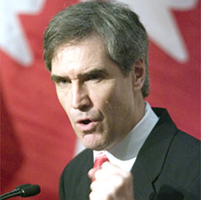
Everyone makes mistakes, but those who write for public consumption are scrutinized more closely. Last year, I thought Stephen Harper would cut economic ties with Cuba and allow the sale of Radarsat-2. Two years ago, I believed George W. Bush would bomb Iran.
So I sympathize with Murray Brewster who, in the rush to cover last month's coalition agreement, reported that "New Democrats will stop opposing Canada's war in Afghanistan while the party is in league with the Liberals." This, the veteran Canadian Press journalist concluded, was "a significant concession for a party that has been the standard-bearer for the peace movement in Canada."
Other observers then relied on Brewster's account. In these pages, Bill Tieleman wrote, "the NDP now faces the challenge of explaining to supporters why they were willing to jettison key 2008 election positions -- like wanting Canadian troops out of Afghanistan...."
The explanation is easy: no concession was ever made.
Moreover, the fact that Liberal and NDP negotiators were able to accommodate their policy differences on Afghanistan speaks volumes about the continued viability of the coalition. With the holiday season out of the way, it's time now to refocus on the very real possibility of a new, cooperative and progressive federal government.
What 'putting aside differences' means
The mis-reporting of the NDPs' position on Afghanistan stemmed from a statement by Thomas Mulcair, the deputy leader of the New Democrats. Brewster quoted Mulcair as saying, "The NDP is putting aside its differences that have existed historically with the Liberals on such issues as Afghanistan."
Read in isolation, the statement could seem ambiguous. Does "putting aside its differences" mean adopting the Liberal position or just agreeing-to-disagree?
The answer -- that it's an agreement-to-disagree -- is found later in Brewster's article, where Liberal finance critic Scott Brison is quoted as saying: "All three parties recognize the seriousness and as such we are putting aside our differences to focus on common ground."
Afghanistan isn't mentioned in the coalition agreement or associated policy accord. The focus is on the economic crisis, a matter on which the two parties were -- and are -- able to agree.
Coalition government explained
Decades of majority governments have left Canadians ill-prepared to understand how coalitions work. It's difficult to grasp the fact that we elect individual members of Parliament rather than parties or prime ministers, and leave it to our MPs to sort the rest out.
The central requirement is that any government must enjoy the support of the majority of MPs when matters of "confidence" are put to a vote. According to longstanding practice, confidence votes are limited to speeches from the throne, spending bills and specifically designated, opposition-called votes of non-confidence.
When no single group of MPs (a party) holds the majority of seats in the House of Commons, a smaller grouping can form a minority government. But they must still be able to obtain enough vote-by-vote support from other MPs to prevail on confidence matters.
Canada has had 14 minority governments at the federal level, including three during the last four years. The most recent of these was Mr. Harper's second government, which obtained majority support for the speech from the throne before Parliament was abruptly prorogued.
A coalition is different because two or more parties form a single government. Cabinet posts are shared out between the parties, which negotiate policy between themselves before presenting it to the House.
In the Liberal/NDP coalition, six New Democrats will be full-fledged cabinet ministers. Another six will be "parliamentary secretaries" -- junior cabinet members who assist a minister and attend cabinet meetings.
Since cabinet members are responsible for implementing government policy, these 12 New Democrats will be more constrained than their 25 caucus colleagues during votes in the House of Commons. The coalition agreement recognizes this, specifying that "The rules and practices of cabinet confidentiality and solidarity will be strictly maintained."
In return, they'll exercise considerable influence over policy-making. With both parties intent on providing Canadians with an effective and stable government, there's a strong shared interest in avoiding coalition-ending disagreements or slights. The coalition agreement spells out that the parties will consult continuously on a "no surprises" basis.
How the agreement-to-disagree works
The agreement-to-disagree concerns the timing of Canada's withdrawal from the counterinsurgency mission in Kandahar. The New Democrats want our soldiers home as soon as possible; the Liberals committed themselves to a 2011 exit-date when they voted for a Parliamentary resolution last March.
It's a significant difference of policy, but not one that threatens the coalition. The first vote on the extension to 2011 wasn't constitutionally required, and a confirming vote isn't required now. In our British-derived parliamentary system, the prime minister holds the power to deploy troops on his own. When Mr. Harper put an earlier extension of the Afghanistan mission to a vote in May 2006, he said that he'd extend the mission with or without the support of the House.
Neither coalition partner is about to call for another vote on the 2011 exit-date.
Nor will the Conservatives cause mischief on this front. If they did, New Democrat MPs would behave just like 139 of Tony Blair's Labour MPs did when they voted against deploying troops to Iraq in 2003. Blair carried the day with the support of Conservative MPs -- and the dissident Labour MPs remained part of his government.
As for the 12 NDP cabinet members, they could -- in the implausible and exceptional circumstances that I've just described -- be permitted to vote on party lines. Any NDP cabinet member with responsibilities in the foreign or defence policy domains would then implement the expressed will of Parliament.
Moreover, agreeing-to-disagree on the withdrawal date doesn't preclude agreement on other, equally important aspects of the Afghanistan mission.
Harper breaks his word
The two parties have agreed on aspects of the Afghanistan mission before. In April 2007, Dawn Black and Michael Ignatieff both demanded the dismissal of then-defence minister Gordon O'Conner after reports that prisoners transferred from Canadian custody had been tortured.
It's time for a strong common position again, because Mr. Harper is defying the expressed will of Parliament concerning the character of the mission.
On Dec. 6, the Globe and Mail's Graeme Smith reported that Canada's military leaders were promising more offensive operations through the winter months. Brig.-Gen. Richard Blanchette predicted more "kinetic energy" as thousands of additional U.S. troops arrived.
The increased kinetic energy is already visible. Nine Canadian soldiers died last month as they struggled to maintain an 80 kilometre supply route to a new base for incoming Americans.
This clearly runs counter to the Parliamentary resolution of March 2008, which redirected the Canadian Forces towards (a) training the Afghan National Security Forces; (b) providing security for reconstruction and development efforts in Kandahar; and (c) the continuation of Canada's responsibility for the Kandahar Provincial Reconstruction Team.
As Mr. Ignatieff said, "Parliament extended the mission on the explicit understanding that the mission would change and focus upon reconstruction and training." Then-Liberal leader Stéphane Dion went so far as to describe the resolution as "a contract between this government and Parliament."
Now, just nine months later, Canadian soldiers are paying the ultimate price for Mr. Harper's cynical willingness to break his word.
On this, Liberals and New Democrats can easily agree. The Parliamentary resolution is Liberal Party policy; for the NDP, a shift towards reconstruction and development is the next best thing to an early withdrawal.
So let's continue to disagree -- and also, together, change the direction of the war.
Related Tyee stories:
- Coalition Not Ready for Prime Time
NDP, Liberals will pay big for what looks like a failed gamble. - The Case for the Coalition
Harper is a dangerous driver, and we're taking away the keys. - Coalition? Back off Jack!
NDP is crazy to team with Liberals and Bloc. Besides, Harper won.
Read more: Politics















Tyee Commenting Guidelines
Comments that violate guidelines risk being deleted, and violations may result in a temporary or permanent user ban. Maintain the spirit of good conversation to stay in the discussion.
*Please note The Tyee is not a forum for spreading misinformation about COVID-19, denying its existence or minimizing its risk to public health.
Do:
Do not: